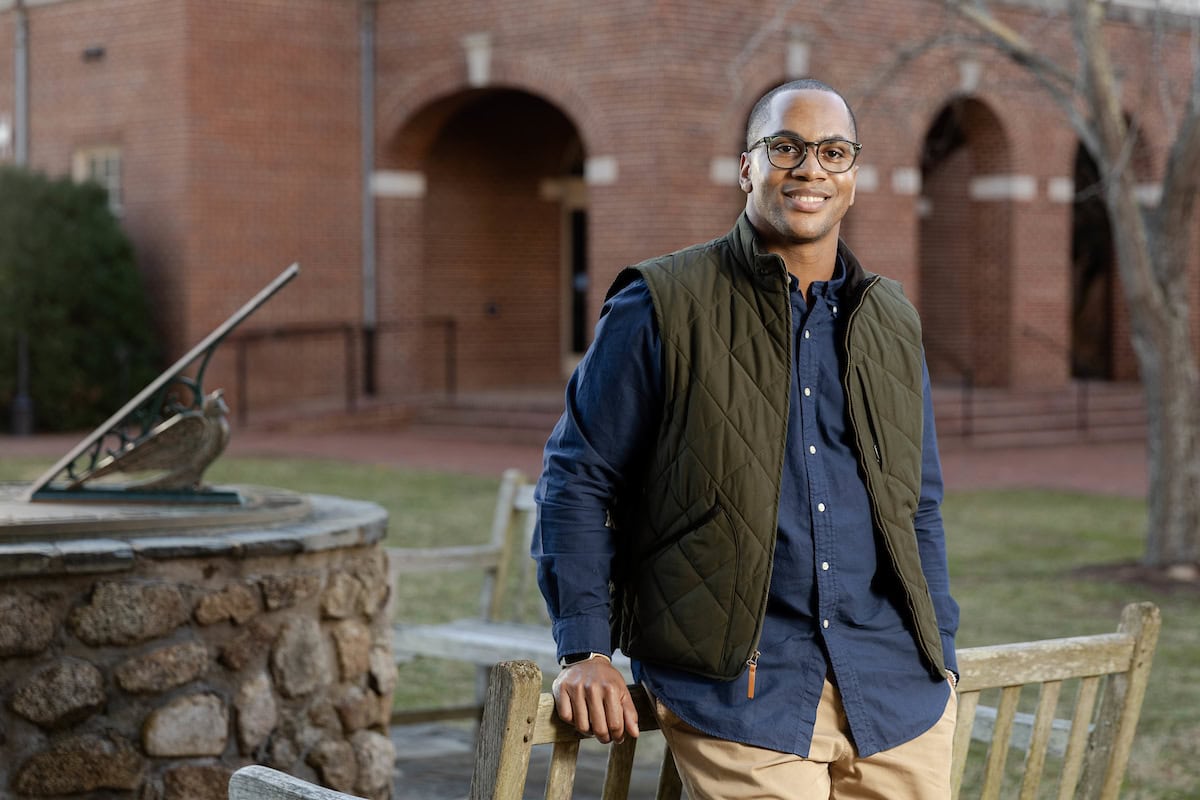The Power of Voice: Randolph grad opens up about challenges of overcoming stuttering

Carl Coffey ’11
About 80 percent of children who stutter at some time during their development become fluent speakers.
Carl Coffey ’11 is focused on the 20 percent who, like him, grow up to be adults who stutter.
“I didn’t really know anyone who stuttered that I could look up to as a role model when I was a kid, so now I want to be as open about it as I can,” he said. “As I’ve become older, I’m a lot more comfortable. It’s just a part of who I am.”
Coffey, who majored in psychology at Randolph, has used social media, particularly LinkedIn, to connect with other people who stutter.
He shares links to raise awareness and start conversations; one recent post linked to a story about retired football player and media personality Shannon Sharpe discussing his own speech impediment.
“It’s been really cool for me as I’ve posted these things and been more open about it. I have connected with a lot of other people who have never really talked about their stutter,” Coffey said. “There are so many platforms that are allowing people to have that conversation, to really find their own voice and talk about it.”
In 2023, Coffey partnered with the National Stuttering Association to produce a video series discussing his career journey. Called Full Disclosure, it featured topics ranging from how to disclose your stutter, requesting accommodations, and handling discrimination in the workplace to networking, negotiating, and accepting a job offer.
“It is one of those disabilities where there’s not a lot of public understanding,” he said. “People still think, if you stutter, it’s just because you’re nervous or unsure of what you want to say. It’s about being able to raise awareness to say, ‘Hey, it is a neurological condition. While there are some days you may not notice it as much, I still am a person who stutters.’”
Coffey spent most of his younger years as what’s referred to as a covert stutterer—someone who tries to mask their condition.
“I was uncomfortable talking about it and acknowledging it,” he said. “I was a really outgoing kid, and I tried my best to make people laugh. I wanted to take the attention off of me and my stutter.”
His parents were always supportive, encouraging him to push through any challenges.
“My dad told me something that I take to heart,” Coffey remembered. “He said, ‘Hey, everyone’s got their thing, something they either are not comfortable with acknowledging or that they’re self conscious about. With you, it’s the fact that you stutter. That’s just your thing. You have to find a way to be OK with it and know you can still live a good life.’”
It would take Coffey years to get to that point.
He continued to hide his stutter as a student at Randolph, where he was part of the College’s first coed class.
An active student, he served as Student Government president and publicity coordinator for the Black Leaders Association, while also competing on the tennis and cross-country teams.
“A lot of people would say they had no idea I stuttered,” he said. “My response to that was, ‘I know, because I purposely tried to hide it.’ So even when I was in college, I didn’t know how to talk about it.”
Coffey took speech therapy from kindergarten through his senior year of high school, then returned to it as an adult, a turning point for him.
“I was in a job where I had to present in a lot of meetings,” said Coffey, who has worked in financial services, healthcare operations, and consulting since graduating from the College. “I wanted to feel more confident in portraying my thoughts and not feeling like I was being held back. I tried to find comfort in knowing this is something that is clearly not going away, but it didn’t have to be a deal breaker. It’s just the way I talk.”
Currently living in Bowling Green, Kentucky, he remains connected to the College. He recently returned to campus to speak to students as part of National Disability Awareness Month, talking about equal employment opportunities and promoting diversity and inclusion in the workplace.
Coffey also joined the Board of Trustees in 2022 as its youngest elected member.
“It is a really incredible experience to have this full circle moment,” he said. “I was very involved as a student, so I had agood opportunity to interact with the Board of Trustees as president of Student Government. It’s been awesome to come back to help the College and support students in this capacity.”
For Coffey, it’s about giving back to a place that gave him so much.
“Randolph is a place where you don’t just blend into the background,” Coffey said. “You’re deeply embedded into a community where you matter, your contributions are valued, you shape the culture, you’re held accountable, and you leave your imprint. It’s a place where I found the power of my voice, and I’m forever grateful for that.”
Tags: outcomes, psychology, Vita Spring 2024
